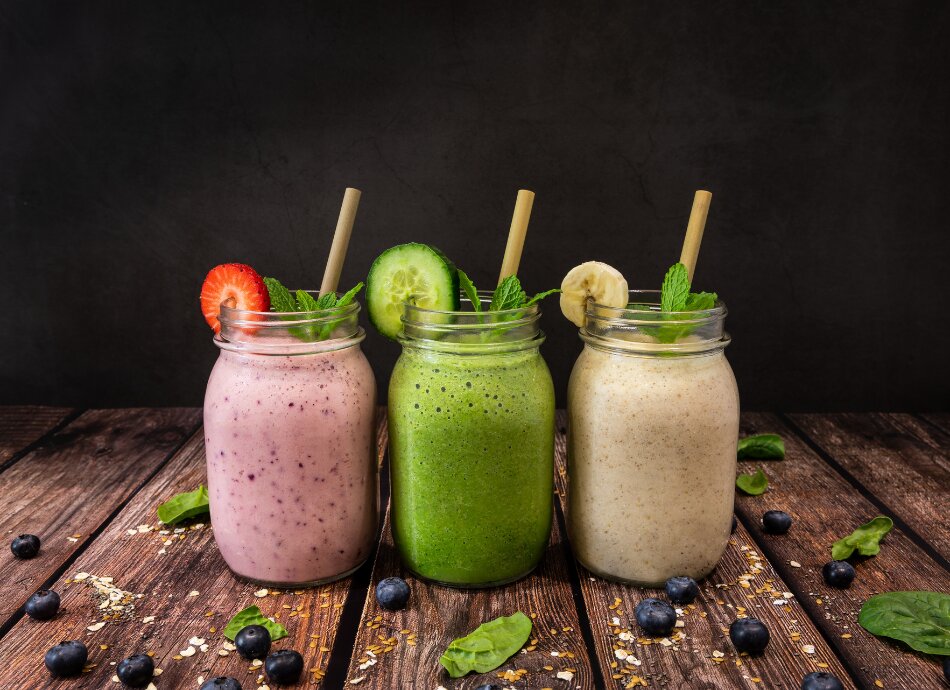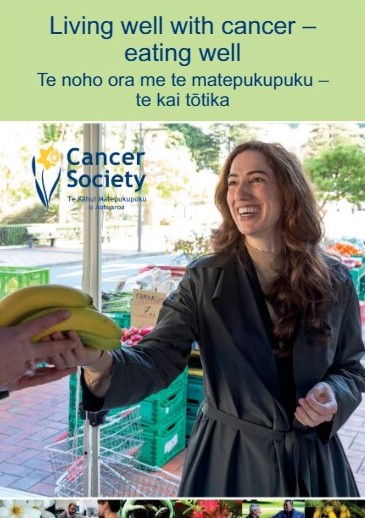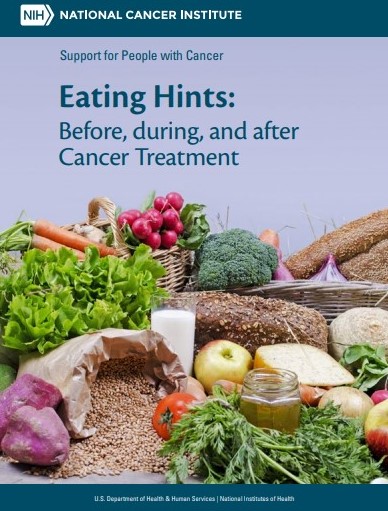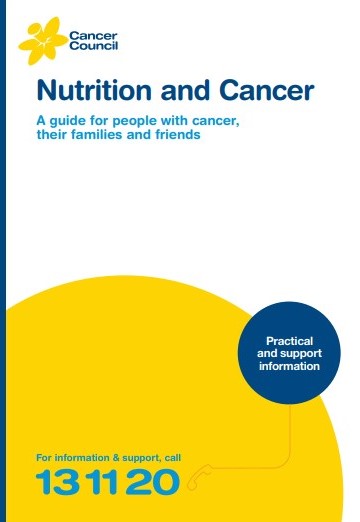Cancer – eating well
Key points about eating well when you have cancer
- Eating well is important when you have cancer.
- Cancer and the treatment you have for it can put extra demands on your body.
- But when you have cancer, eating well isn’t always easy. So the kind of kai and how you eat might change.

Having a healthy diet can help you:
Because it’s important you eat well when you have cancer, you might get referred to a dietitian. A dietitian will give you support personalised to you, your cancer and your treatment.
The side effects of cancer and its treatment can cause lots of different eating problems.
Some of these eating problems include:
- making you feel sick (nausea)
- being sick (vomiting)
- not feeling hungry (loss of appetite)
- feeling tired (fatigue)
- changes to your taste and smell
- problems swallowing or chewing.
These can all make it hard to eat well during your cancer treatment. Not everyone gets every eating problem, and some people might not get any. It depends on things like the type of treatment you have.
The good news is that many of these can be managed or treated. See below for tips on how to manage side effects.
If you’re struggling, talk to your cancer treatment team. You can ask for a referral to a dietitian who will be able to help you.
Feeling sick (nausea)
This is one of the most common side effects of cancer treatment. If you’re feeling sick, there are lots of things you can try:
- Having your anti-sickness medicine before you eat (but check with your doctor).
- Eating small and frequent meals instead of 3 large meals.
- Going for cold kai instead of hot or spicy foods.
- Having ginger foods or drinks like ginger beer, dried ginger and ginger biscuits.
- Avoiding preparing kai while you feel sick.
Being sick (vomiting)
If your cancer treatment has made you be sick, then eating and drinking can be hard. But it’s important you don’t get dehydrated (too thirsty).
Some things you can do that might help:
- Sip fluids often – these include water, flat lemonade, ginger ale or sparkling water.
- Sucking on an ice-block or hard lolly.
- Trying bland, dry foods like crackers, pretzels or plain toast.
- Once the vomiting stops, start eating again slowly until your eating returns to normal.
If you can’t keep fluids down or vomiting lasts more than 24 hours, contact your healthcare team.
Not feeling hungry (no appetite)
There’s lots of reasons why you might not feel hungry when you have cancer. But even though you might not feel like eating, it’s a good idea to think of it as part of your cancer treatment plan.
When you’re not hungry try these:
- Choosing kai higher in calories and protein so you make the most of what you do eat (see below for ideas).
- Eating smaller and more frequent meals during the day.
- Having nutritious drinks like smoothies or milk.
- Not drinking fluids with your meals, as these can fill you up.
Feeling tired (fatigue)
You might feel very tired when you have cancer. Being tired makes it harder to fit eating in.
When you don’t have much energy try to:
- accept help with shopping or cooking from friends and whānau
- go for ready meals you can heat in the microwave
- have quick snack options nearby like hard boiled eggs, cheese and crackers, muesli bars, nuts or fruit.
Changes to your taste or smell
Depending on the type of treatment you have, you might find kai tastes or smells differently. Or it might not taste like anything at all.
If this happens, you could try:
- using flavours like ginger, garlic, herbs and chilli if food tastes bland
- going for cold foods, as hot food smells stronger
- eating new types of kai – you might be surprised what you like
- asking friends or whānau to cook, if cooking smells put you off.
Problems chewing or swallowing
If you’re having trouble chewing or swallowing, you might need to change the texture of your diet. This could mean eating soft foods or it could mean eating foods that have been blended/pureed. For many people these problems are temporary, so eating a texture-modified diet won’t be forever.
If you’re having difficulty swallowing and struggling to keep a healthy weight, you will normally be referred to a dietitian and speech language therapist. They will check your swallow and help you get your nutrition from a texture-modified diet.
|
If you think you need more support to manage eating problems, talk to your cancer treatment team. |
Changes to your weight can be common when you have cancer treatment. Some people might gain weight. But many people find they lose weight.
To help your treatment, it’s best to try stay the same weight you were before your cancer diagnosis. To prevent weight loss, aim to eat more foods high in energy (calories) and/or protein.
High energy foods include:
- full fat (blue top) milk or cream
- nuts and nut butters
- avocado
- cheese
- butter, oils and spreads
- baking like cakes, scones, muffins.
High protein foods include:
- eggs
- meat
- fish
- tofu
- beans and lentils
- nuts or nut butters
- yoghurt.
If you’re struggling to eat enough, you might be recommended a nutritional supplement drink. These include powders or ready-to-drink liquids. You can have these as well as your meals and snacks, to help you get enough calories.
Nutritional supplement drinks
These include:
- Ensure powder
- Ensure Plus (ready to drink)
- Complan powder
- Fortisip (ready to drink).
You can buy some of these at supermarkets or pharmacies. Some people might be able to get them on prescription. Talk to your cancer treatment team if you think a nutritional supplement drink might help you.
Is there a special diet that cures cancer?
No. There’s no good evidence that any nutrient, food or special diet can cure cancer. Sometimes these unproven claims encourage cutting out whole food groups. This can make it even harder for you to eat well.
If you do decide to change what you eat a lot or follow a specific diet, make sure you tell your cancer treatment team.
Does sugar feed cancer?
There’s no good evidence that sugar feeds cancer. Or that cutting out sugar from your diet boosts the chances of survival.
This myth started because cancer cells need a lot of glucose (a type of sugar). Unfortunately, it’s not that simple. All your body’s cells need glucose, and there’s no way of telling your body to let the healthy cells have the glucose they need, but not give it to the cancer cells.
Should I eat organic fruits and vegetables?
There’s no good evidence that eating organic foods helps your cancer treatment or stops cancer from coming back.
All fruit and vegetables are healthy. It’s more important to get a wide variety than to spend money on organic food.
Should I avoid soy foods?
It’s a myth that soy foods cause cancer. Some of the misunderstanding has come from the idea that soy foods could increase oestrogen in your body which can increase the risk of cancer. But research so far doesn’t support this.
Soy products like tofu are a great source of protein that you can use in lots of different meals. Try using them in soups, curries or stir-fries.
Did my diet cause my cancer?
Diet can affect your risk of cancer. But we can’t tell what caused an individual person’s cancer. No one should feel blamed for having cancer.
Everyone’s risk of cancer depends on lots of different things. This includes things you can’t change like how old you are or your family history.
Should I take vitamin or mineral supplements?
Getting enough vitamins and minerals is important. It’s best to get these from foods and drinks if you can.
There’s no good evidence that high doses of vitamins or minerals help cure cancer, and in fact some could do harm. Some supplements can interfere with medicines, so always tell your cancer treatment team if you decide to take them.
Apps reviewed by Healthify
You may find it useful to look at some Nutrition apps.
Eating well(external link)(external link) Cancer Society, NZ
Nutrition(external link)(external link) Cancer Council Victoria, Australia
Eating problems(external link)(external link) Macmillan, UK
Diet problems with cancer(external link)(external link) Cancer Research, UK
Nutrition for people with cancer(external link)(external link) American Cancer Society
Resources
Living well with cancer – eating well [PDF, 5.5 MB] Cancer Society, NZ, 2020 English/te reo Māori [PDF, 5.5 MB]
Eating hints: Before, during, and after cancer treatment(external link)(external link) National Cancer Institute, US, 2018
Nutrition and cancer: A guide for people with cancer, their families and friends(external link)(external link) Cancer Council, Australia, 2019
Oral nutrition supplements(external link)(external link) HealthInfo, NZ, 2018
References
- Living well with cancer – eating well [PDF, 5.5 MB] Cancer Society, NZ
- Nutrition and cancer(external link)(external link) Cancer Council
- Eating hints before, during and after cancer treatment(external link)(external link) National Cancer Institute, US
Apps
Brochures

Cancer Society, NZ, 2020
English/te reo Māori

National Cancer Institute, USA, 2018

Cancer Council, Australia, 2019
Credits: Healthify editorial team. Healthify is brought to you by Health Navigator Charitable Trust.
Reviewed by: Emma Shields, Registered Dietitian, Wellington
Last reviewed:
Page last updated:





